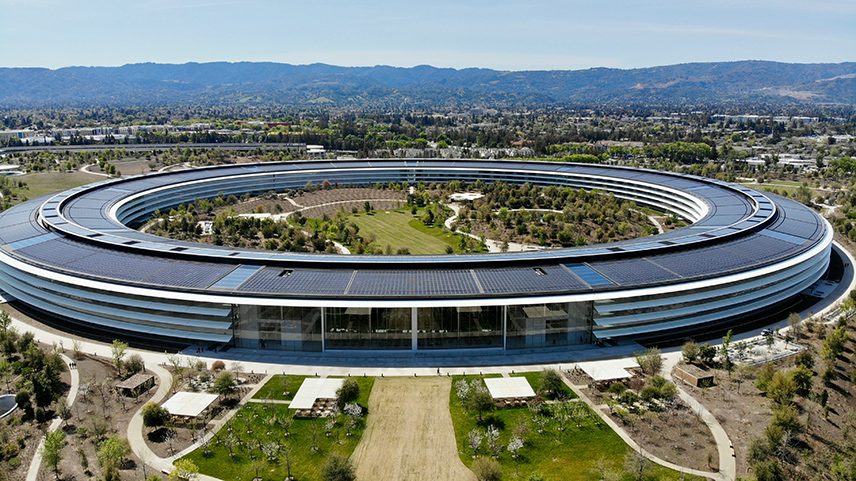Game Changers Of The World Cleantech Companies To Watch Out For Where tech meets sustainability!


By Kratika Agarwal
In the spirit of World Environment Day, it’s important to highlight how technology can drive positive change for our planet. While tech news often focuses on the latest launches and device innovations, a growing number of companies are prioritising sustainability. Cleantech refers to enterprises that emphasise sustainable production methods, often overlooked in their journey to global prominence.
This World Environment Day, we highlight 7 tech giants that excel in both the technological and environmental spheres.
Apple
The world-renowned tech giant Apple has been a practised contender for clean energy for years now. Many of its products are made with recycled stocks, including the MacBook Air, iPhone 12, and even its watch series. The company claims to have made some new progress in expanding clean and renewable energy across the globe by establishing a goal to become carbon neutral by the end of this decade. This giant also launched a Supplier Clean Water Programme in 2013, which eventually helped its suppliers save more than 12 billion gallons of fresh water last year. More than a hundred of Apple’s suppliers have pledged to accompany the company on its carbon neutrality journey.
Dell
This company believes that being sustainable is at the heart of everything it does. Reports suggest that the company is now working with its suppliers to reach net-zero greenhouse gas emissions by 2050 and to reduce its emissions by 60% per unit of revenue by 2030. One noteworthy aspect is that Dell keeps 90% of its waste out of landfills by using 100 million pounds of recycled plastic in its products. Its 2030 sustainability goals align with the United Nations Sustainable Development Goals, which are an incredible vision for the peace of people and the planet.
Microsoft
Tech companies like Microsoft are increasingly seeking clean energy solutions to meet their sustainability goals. Earlier this year, Microsoft Corp. is said to have signed a clean tech agreement with Brookfield Asset Management, which solidifies the company’s position as a corporate buyer. By 2025, the company plans to meet 100% of its energy needs through renewable sources, making it one of the largest purchasers of renewable energy globally. In addition to this, Microsoft has also launched a ‘Climate Innovation Fund’ that aims to remove all carbon emissions since 1975.
Samsung
Using its on-site waste, this multinational manufacturing conglomerate based in South Korea aims to create safer operations. In line with its 2021 Sustainability Report, Samsung intends to increase the usage of renewable energy sources worldwide. To increase the use of renewable energy in their workplaces, Samsung has developed and put into practice a number of action plans, such as adding solar and geothermal facilities in their parking lots, roofs, and new buildings.
HP
HP has committed to becoming carbon neutral by 2040 and aims to power its global operations entirely with renewable energy by 2025. The company is also channelling investments into sustainability research and development to innovate new technologies that will help achieve zero waste across all operations by 2025 and promote resource conservation. HP focuses on high energy efficiency and utilises recycled and ocean-bound plastics to manufacture eco-friendly products. Through its five climate action strategic drivers—print and compute as a service, sustainable materials, supply chain decarbonisation, energy efficiency, and forest investments—HP is dedicated to reducing greenhouse gas emissions and resource consumption.
Asus
ASUS is recognised globally for its sustainability efforts, earning a reputation as an environmentally friendly tech company. Integrating sustainability into its strategy, ASUS aims to be a leader in green high-tech, contributing significantly to a circular economy. The company was lauded for its innovative, eco-friendly products and clean revenue generation. In 2023, ASUS achieved Leadership-level scores from the Carbon Disclosure Project (CDP) for its Climate Change report and Supplier Engagement Rating, highlighting its transparency and effective supply chain engagement on climate issues.
Lenovo
Lenovo is committed to sustainability and environmental friendliness, achieving improvements for both clients and staff. Awarded the BDO 2021 ESG Award and named one of the 100 most sustainable companies in the world by Corporate Knights, Lenovo surpassed its 2020 climate target one year ahead of schedule. It has reduced emissions by 92% in the last ten years and is aiming to cut greenhouse gas emissions by 40%. Additionally, the business uses sustainable packaging materials like sugarcane and bamboo.
More from our site
Recent Posts
The New Defender OCTA: Epitome of Power, Luxury and Performance
New Defender OCTA is the most dynamically accomplished Defender ever created, with unmatched breadth of capability and performance both on- and off-road
New Defender OCTA is the most dynamically accomplished Defender ever created, with unmatched breadth of…
Shaping Tomorrow’s Golf Champions With Leela Palace Bengaluru
The 3rd edition of The Leela Golf Tournament celebrated young talent and brought together skill, precision and camaraderie!
The 3rd edition of The Leela Golf Tournament celebrated young talent and brought together skill,…
The Duo Behind Late Checkout, Redefines Hospitality
In conversation with the founders of Pawan Shahri and Nikita Harisinghani, the duo behind Chrome Hospitality Asia
In conversation with the founders of Pawan Shahri and Nikita Harisinghani, the duo behind Chrome…
Precision, Durability, and Swiss Legacy
Victorinox launches the Swiss Army collection, featuring three distinct models that emphasise exceptional quality, resistance and versatility
Victorinox launches the Swiss Army collection, featuring three distinct models that emphasise exceptional quality, resistance…
A New Era of Luxury Interiors With Sussanne & Gauri Khan
Sussanne Khan & Gauri Khan unite to bring an awe-inspiring, six-storey sanctuary of luxury, art, and design in Hyderabad
Sussanne Khan & Gauri Khan unite to bring an awe-inspiring, six-storey sanctuary of luxury, art,…
Air India x Lufthansa: Fly To These International Destinations Now
Expanding their codeshare partnership, Air India and Lufthansa Group have added 100 new routes to their combined network
Expanding their codeshare partnership, Air India and Lufthansa Group have added 100 new routes to…


